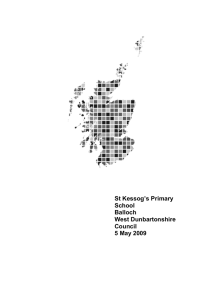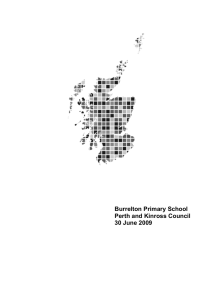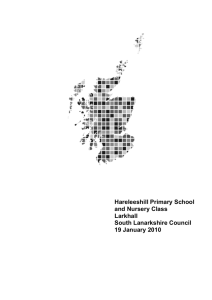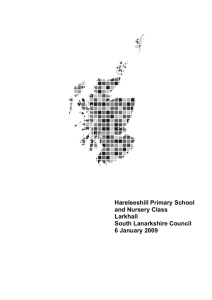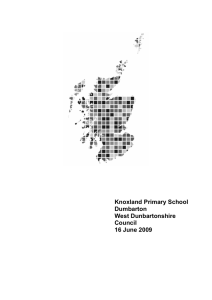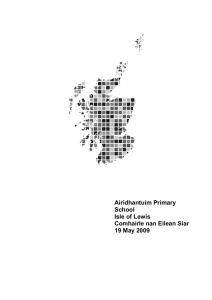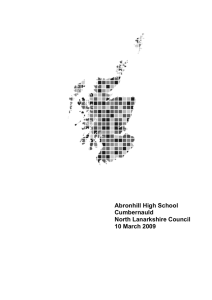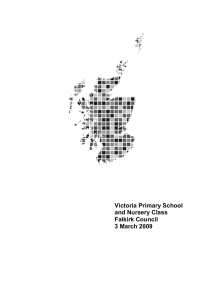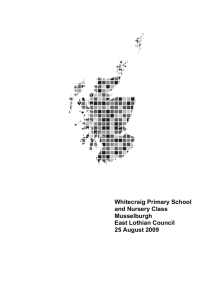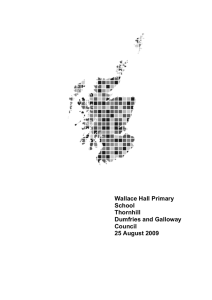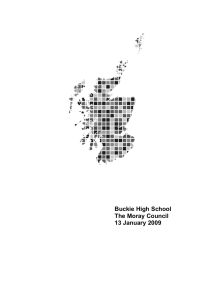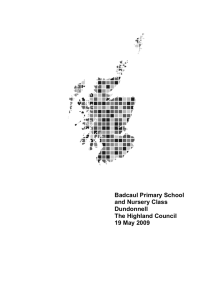Sacred Heart Primary School Girvan
advertisement
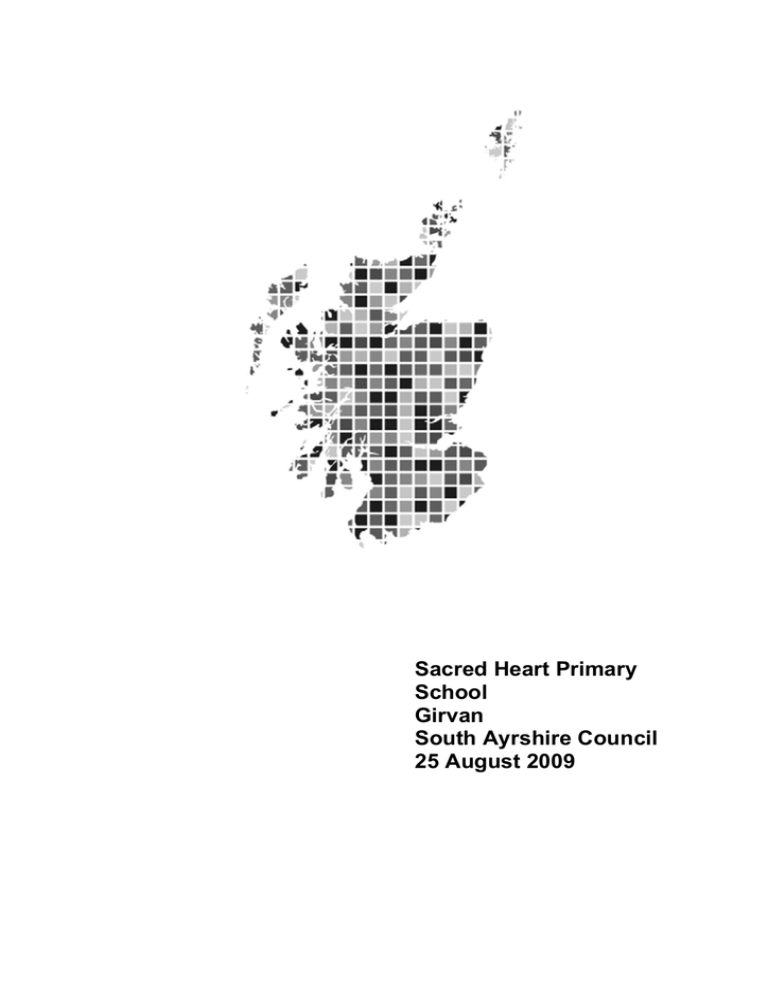
Sacred Heart Primary School Girvan South Ayrshire Council 25 August 2009 This report tells you about the quality of education at the school1. We describe how children benefit from learning there. We explain how well they are doing and how good the school is at helping them to learn. Then we look at the ways in which the school does this. We describe how well the school works with other groups in the community, including parents2 and services which support children. We also comment on how well staff and children work together and how they go about improving the school. Our report describes the ‘ethos’ of the school. By ‘ethos’ we mean the relationships in the school, how well children are cared for and treated and how much is expected of them in all aspects of school life. Finally, we comment on the school’s aims. In particular, we focus on how well the aims help staff to deliver high quality learning, and the impact of leadership on the school’s success in achieving these aims. If you would like to learn more about our inspection of the school, please visit www.hmie.gov.uk. Here you can find analyses of questionnaire returns. Where applicable, you will also be able to find descriptions of good practice in the school. 1 2 The term ‘school’ is used to include the work of the nursery class, where relevant. Throughout this report, the term ‘parents’ should be taken to include foster carers, residential care staff and carers who are relatives or friends. Contents 1. The school 2. Particular strengths of the school 3. Examples of good practice 4. How well do children learn and achieve? 5. How well do staff work with others to support children’s learning? 6. Are staff and children actively involved in improving their school community? 7. Does the school have high expectations of all children? 8. Does the school have a clear sense of direction? 9. What happens next? 1. The school Sacred Heart Primary School is a denominational school. It serves the town of Girvan and the surrounding rural area. The roll was 107 when the inspection was carried out in June 2009. Children’s attendance was in line with the national average in 2007/2008. 1 2. Particular strengths of the school • Confident, friendly children who are actively involved in the community and developing their wider achievements. • The very caring, supportive and welcoming ethos. • The contribution of parents to the life and work of the school. • Staff teamwork in improving children’s learning experiences. • The headteacher’s leadership of improvements to the curriculum. 3. Examples of good practice • The use of GLOW technology to develop strong partnerships with a school in Stornoway. • Parental involvement in Curriculum for Excellence. 4. How well do children learn and achieve? Learning and achievement Children across the school are highly motivated and actively involved in their learning. They listen well to teachers and to each other and enjoy regular opportunities to assess their own work and the work of others in their classes. This is helping them to be more aware of how they can improve their own learning. At the early stages, children learn literacy, numeracy and social skills well through play at the start 2 of the day. Across the school, children use information and communications technology (ICT) well to support their learning. For example, children in the middle stages have established links with a school in Stornoway using the Internet. Children in both schools are learning more about their areas and cultures as well as developing strong friendships. Staff use activities out of class to extend children’s skills and abilities. For example, after visiting the ‘Cooking Bus’, children cook in school. The upper primary class have organised a very successful fashion show as part of their enterprise programme. They have used their literacy and numeracy skills in a practical way to advertise, plan and run the event. Children are successfully developing their teamwork skills in groups such as the school council and eco committee. Their editorial team produces very attractive school newsletters. Across the school, children fully understand the benefits of healthy eating and being physically active. Almost all children, including those with additional support needs, are making very good progress in English language and mathematics, taking account of their prior levels of achievement. In recent years, most children have attained appropriate national levels in reading and writing. Almost all do so in mathematics where significant numbers of children from P2 to P5 achieve levels earlier than expected. Over the last few years, the school has maintained good levels of attainment in reading and very good levels in mathematics. Attainment in writing has dipped slightly in recent years. The school has taken steps to address this by introducing new approaches to writing. As a result, motivation has increased and writing is improving. In English language, children at all stages listen well to teachers and to each other. They speak clearly and with confidence to express their views. Children across the school read well with understanding. Children at P3 and P4 can select information and language to help them improve their own writing. By P7, children can talk confidently about texts they are reading. They read widely for enjoyment. Children have regular opportunities to write at length for a variety of purposes. In mathematics across the stages, children are developing appropriate 3 skills in mental and written calculation. Younger children are developing skills in using adding and subtracting to help them to solve problems. At P6 and P7, children can use problem solving strategies well when developing a seating plan. They can discuss and assess different solutions effectively. Curriculum and meeting learning needs Children enjoy a broad curriculum which is helping to develop their skills in a wide range of areas. Staff are aligning the curriculum with national guidance on Curriculum for Excellence. Teachers plan learning across the curriculum to take good account of the skills children are learning. Children have good opportunities to use literacy and numeracy skills through, for example, environmental studies projects. The school provides two hours of good quality physical education for all children each week. At P6 and P7, children are successfully learning French. Children benefit from a well-planned health and wellbeing curriculum. This is improving their personal and social skills and developing their awareness of equality and fairness. Staff ensure children have good opportunities to take part in educational outings to extend their learning and achievement. Staff meet children’s needs well. Tasks, activities and resources effectively meet the needs of almost all children. Teachers know children well and are sensitive to the needs of individuals in their classes. However, tasks and activities are sometimes too easy for higher-achieving children. Staff should ensure a few children with additional needs benefit from learning and working with others in classes. Staff give clear instructions, share the purposes of learning with children, and effectively encourage them to think about what they have learned. Teachers’ questions help to build on children’s previous learning and challenge them to think for themselves. Homework tasks are varied and linked appropriately to what children learn in class. Support staff effectively help children across the school. The school is very good at identifying children’s learning needs. The support for learning teacher provides high-quality support to children, staff and 4 parents. Children with additional support plans are making good progress towards targets set to improve their learning. 5. How well do staff work with others to support children’s learning? The school has very good links with a range of partner agencies to support children and families, including health and social work services. There are strong links with Ayr Football Club who have provided football training sessions for children and a community football festival. The local Carrick Burns Club assists the school in an annual community Burns assembly. This is very well attended by parents and the local community. The Parent Council and other parents support the school very well. The school provides parents with helpful newsletters, progress reports and questionnaires about its work. The school consults parents about sensitive health issues. Staff are successfully involving parents in developing aspects of Curriculum for Excellence. Staff seek their views on projects across the curriculum and hold information sessions after school and in the evening. Appropriate arrangements are in place to support children transferring from nursery to P1 and from P7 to Queen Margaret Academy and Girvan Academy. The school is good at dealing with complaints. 6. Are staff and children actively involved in improving their school community? Children play an active part in the school community through the pupil council. Children contribute to decisions which benefit the whole school, such as buying new Scottish fiction. Through the eco committee, children help to reduce waste and encourage recycling. All children in P7 are helping to explore and conserve their local environment as part of their work for a John Muir Award. Children in P6 and P7 are buddies to younger children and enthusiastically act as junior road safety officers. Staff regularly 5 discuss improvement to learning and teaching and new ways of improving the work they do. The headteacher regularly seeks the views of children and parents about improvements to the school and uses these to improve aspects of the school. Managers evaluate the school’s work in a variety of effective ways. They offer teachers useful advice and suggestions for improvement during regular visits to classes. The headteacher monitors children’s achievement and ways in which learning can be improved. Self-evaluation is having a positive impact on improving learning and teaching. 7. Does the school have high expectations of all children? Children are very proud of their school and talk confidently about their achievements in and out of classes. They are polite and courteous and welcome visitors. Staff celebrate children’s achievements at assemblies and through attractive school displays and reward systems. All staff have received training in child protection and are highly committed to the care and welfare of all children. They have high expectations of children’s attendance, behaviour and learning. Teachers motivate learners to do their best and enjoy learning. Children are developing a good awareness of healthy lifestyles and the importance of equality and respect for others. There are regular opportunities for religious observance. The school has very good links with the church and fosters a strong and caring Catholic ethos. 8. Does the school have a clear sense of direction? The headteacher provides very effective leadership for learning across the school. She has a clear vision which all staff share. They focus appropriately on improving children’s experiences in new and interesting ways. The depute headteacher and principal teacher support the headteacher very well. They have made very good progress in taking forward improvements to the curriculum and health and wellbeing. All teachers take on leadership roles. Staff across the school feel that their views are valued and taken into account in 6 delivering school improvements. All staff have a shared commitment to helping the school to improve and work very well as a team. There is a very positive and caring school ethos. The school is well placed to continue to improve. 9. What happens next? As a result of the very good quality of education provided by the school, we will make no further visits following this inspection. The education authority will inform parents about the school’s progress as part of the authority’s arrangements for reporting to parents on the quality of its schools. We have agreed the following areas for improvement with the school and education authority. • Continue to improve attainment in writing. • Meet more fully the needs of children with additional support needs, including higher-achieving children. 7 Quality indicators help schools and nursery classes, education authorities and inspectors to judge what is good and what needs to be improved in the work of a school and a nursery class. You can find these quality indicators in the HMIE publications How good is our school? and The Child at the Centre. Following the inspection of each school, the Scottish Government gathers evaluations of three important quality indicators to keep track of how well all Scottish schools and nursery classes are doing. Here are the evaluations for Sacred Heart Primary School. Improvements in performance Learners’ experiences Meeting learning needs very good very good good We also evaluated the following aspects of the work of the school. The curriculum Improvement through self-evaluation HM Inspector: June Orr 25 August 2009 8 very good very good To find out more about inspections or get an electronic copy of this report go to www.hmie.gov.uk. Please contact the Business Management and Communications Team (BMCT) if you wish to enquire about our arrangements for translated or other appropriate versions. If you wish to comment about any of our inspections, contact us at HMIEenquiries@hmie.gsi.gov.uk or alternatively you should write in the first instance to BMCT, HM Inspectorate of Education, Denholm House, Almondvale Business Park, Almondvale Way, Livingston EH54 6GA. Our complaints procedure is available from our website www.hmie.gov.uk or alternatively you can write to our Complaints Manager, at the address above or by telephoning 01506 600259. If you are not satisfied with the action we have taken at the end of our complaints procedure, you can raise your complaint with the Scottish Public Services Ombudsman (SPSO). The SPSO is fully independent and has powers to investigate complaints about Government departments and agencies. You should write to SPSO, Freepost EH641, Edinburgh EH3 0BR. You can also telephone 0800 377 7330, fax 0800 377 7331 or e-mail: ask@spso.org.uk. More information about the Ombudsman’s office can be obtained from the website at www.spso.org.uk. This report uses the following word scale to make clear judgements made by inspectors. excellent very good good satisfactory weak unsatisfactory outstanding, sector leading major strengths important strengths with some areas for improvement strengths just outweigh weaknesses important weaknesses major weaknesses Crown Copyright 2009 HM Inspectorate of Education
